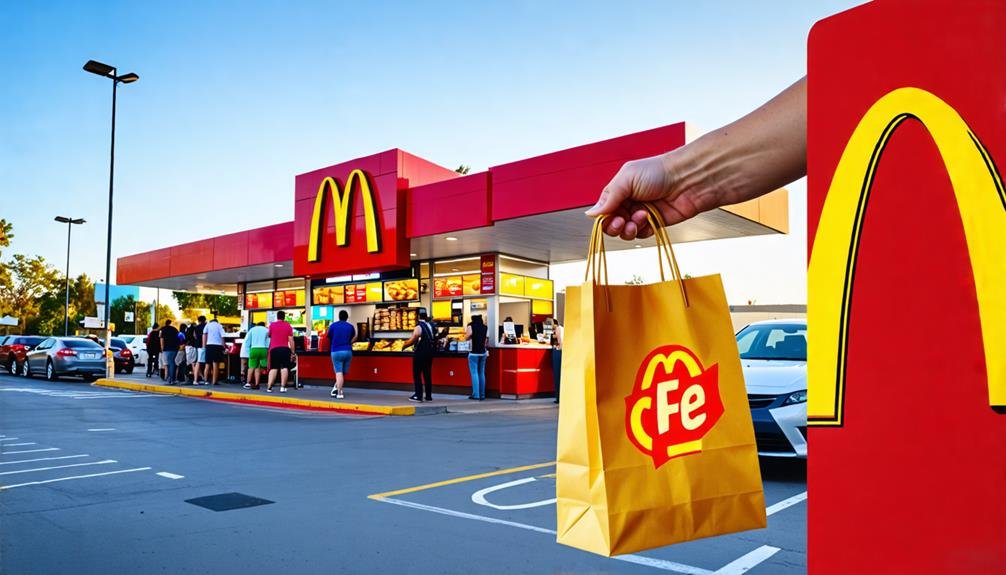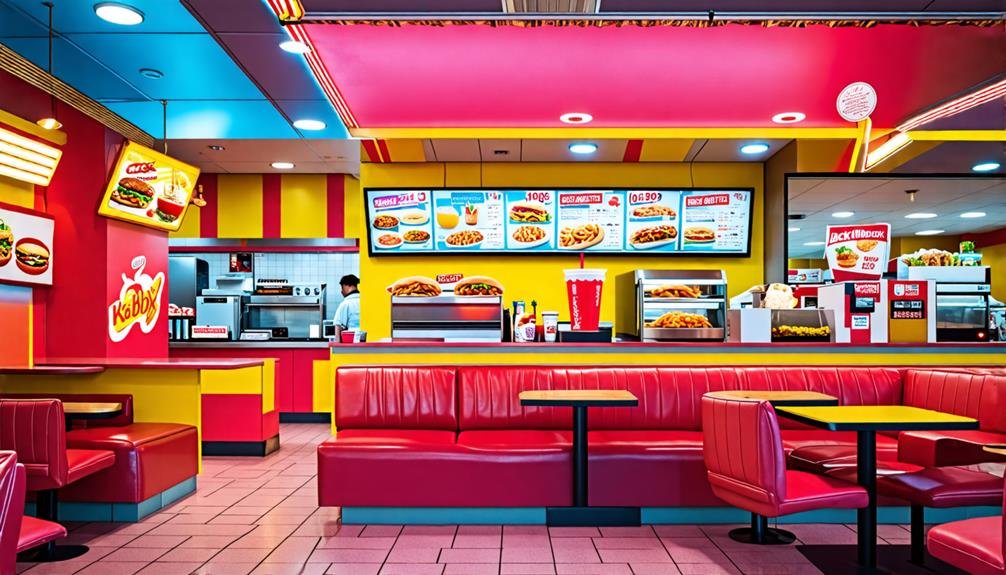The McDonald's bag fee is a key aspect of the company's dedication to environmental initiatives. This fee, influenced by local laws, encourages customers to make sustainable choices and opt for reusable bags. Regions enforce these charges differently; some mandate fees for plastic and paper bags to promote eco-friendly behavior. This initiative not only supports local sustainability efforts but also fosters a culture of personal accountability for environmental impact. While it might cause some surprise for initial customers, understanding these charges can help you contribute to a greener future. Stay with us to discover more about McDonald's eco-friendly practices!
Understanding the Bag Fee
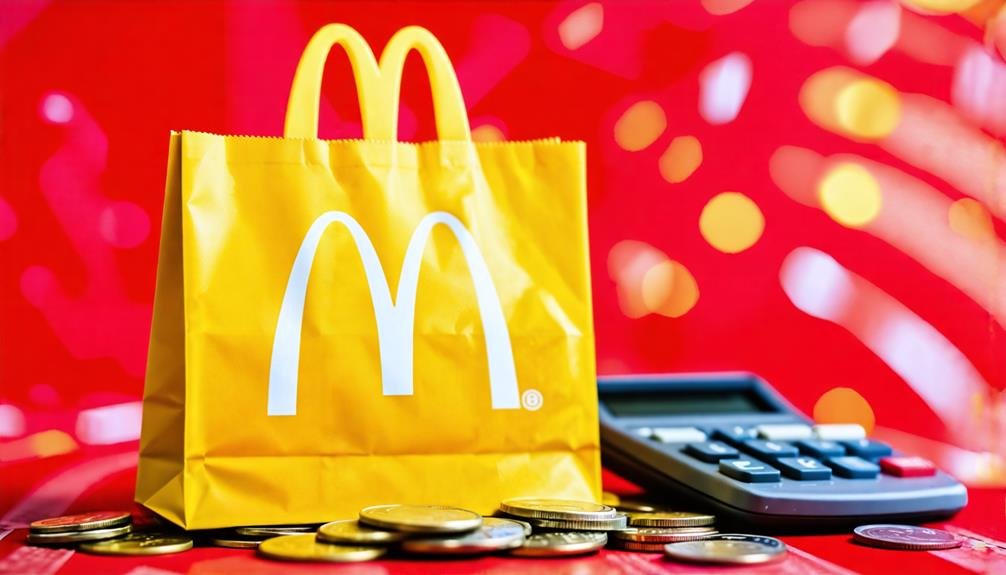
The bag fee at McDonald's locations results from local laws designed to enhance environmental sustainability and minimize waste. As communities become more aware of ecological issues, McDonald's has adopted the bag fee initiative. This action aligns with various fast food charges emerging within the industry, reflecting a growing commitment to eco-friendliness.
McDonald's announcement regarding this fee signifies a pivotal change; the bag fee is not just an extra cost but an invitation for customers to consider their environmental footprint. By promoting the use of reusable bags, McDonald's is cultivating a culture of sustainability that appeals to many individuals who value their ability to make conscientious choices.
While some might see these fees as a hassle, it is important to understand the broader message: each small effort contributes to the greater mission of safeguarding our planet. The McDonald's bag fee serves as a reminder that even in the fast-food sector, there is potential for innovation and accountability. Accepting this shift can empower individuals to take control of their consumption patterns and, in turn, support a healthier environment.
Regional Differences in Bag Charges
Bag fees at McDonald's restaurants differ significantly based on local regulations and community laws, showcasing the varied approaches to environmental sustainability in different regions. As neighborhoods strive to minimize waste and promote the use of reusable bags, these policies can greatly influence your dining experience.
- In places like British Columbia and Wales, government mandates enforce bag fees to encourage eco-friendly behavior.
- Some cities in the United States have implemented similar regulations, requiring charges for both plastic and paper bags.
This collection of policies means that a trip to McDonald's can yield distinct experiences based on your location. While some patrons may be caught off guard by a bag fee, it serves as a reminder of the larger environmental initiative. Ultimately, these fees are not merely about cost; they represent a growing dedication to sustainability and mindful consumption. So, the next time you visit McDonald's, consider bringing your reusable bag and contribute to the push for a greener future! After all, every small effort matters!
Customer Confusion Over Paper Bags

As customers navigate the new landscape of bag fees at McDonald's, confusion often arises regarding the inclusion of paper bags in plastic ban initiatives. Many wonder how charging for paper bags aligns with efforts to reduce plastic waste, prompting questions about McDonald's rationale. The company's assertion that these fees are intended to promote eco-friendliness, rather than profit, adds another layer to the discussion, highlighting the complex relationship between sustainability and consumer behavior.
Impact of Plastic Bans
Confusion arises among shoppers when they encounter paper bags, which seem eco-friendly, under the scope of plastic bans in various regions. Many consumers believe that paper bags serve as a sustainable option; however, the situation is more intricate. Cities such as Pittsburgh have implemented regulations requiring establishments like McDonald's to charge for paper bags, leaving shoppers uncertain about their environmental effects.
- Local Regulations: Shoppers often remain unaware of the complexities in local bag regulations, resulting in unexpected fees at checkout.
- Sustainability Perception: The belief that paper bags are naturally more environmentally friendly can overshadow the reality that their production and disposal also affect ecological footprints.
As the movement to reduce plastic waste progresses, the implications of these bans become more evident. It's essential for consumers to familiarize themselves with local regulations and grasp the larger environmental context, encouraging a more informed and proactive approach to sustainable practices.
McDonald's Bag Fee Justification
Customers often feel confused about McDonald's decision to implement a charge for paper bags, especially in the context of ongoing bans on plastic bags that aim to promote environmentally friendly practices. This confusion arises from the challenge of balancing sustainability with everyday convenience. Many may question why a paper bag, typically viewed as more eco-friendly, carries a fee while plastic options are being eliminated.
McDonald's clarifies that the fees associated with bags are not for profit but rather to support environmentally sustainable initiatives. In cities like Pittsburgh, local laws require such charges to encourage the use of reusable bags. Although McDonald's paper bags are generally recyclable and composed of a significant proportion of recycled materials, the fees are part of a larger strategy to minimize waste.
This change in policy mirrors a broader movement towards sustainability and responsible consumer behavior. By introducing bag fees, McDonald's is taking an active role in encouraging customers to consider their environmental footprint. So, the next time you are caught off guard by a bag fee, remember that it contributes to a greater effort to foster a greener future—one that emphasizes both choice and ecological responsibility.
Impact of Local Laws
The impact of local laws greatly influences bag fees at McDonald's, creating a patchwork of policies that vary by region. In some areas, regulations promote eco-friendliness by enforcing bag charges, while in others, the absence of such laws results in free bags. This variability not only surprises customers but also underscores the growing importance of sustainability in fast food practices.
Regional Regulation Differences
Regional regulations shape the implementation of bag fees at McDonald's, creating a diverse array of practices. This variation can confuse customers. Understanding regional differences is essential for navigating the bag fee landscape.
- California enforces strong environmental laws that require bag fees, promoting sustainability.
- Other regions lack regulations, allowing McDonald's to provide complimentary bags.
These differences directly affect customer experiences. Some patrons may feel frustrated by unexpected charges, while others enjoy areas without bag fees. Local laws influence shopping choices, making it important for consumers to remain aware of regulations in their vicinity. As communities strive for environmental responsibility, grasping the reasons behind bag fees can empower customers to make informed decisions that align with their values while enjoying meals at McDonald's.
Local Law Effects
Local regulations impact the implementation of bag fees at McDonald's, shaping customer interactions and expectations based on varying laws across different areas. In places where local policies encourage sustainability, such as British Columbia and Wales, customers may face mandatory charges for bags. These measures aim to promote the use of reusable bags and decrease single-use waste, aligning with a global commitment to environmental responsibility.
However, the variation in bag fee practices can create confusion among patrons. For example, some customers might be charged for paper bags due to city-specific laws, while others may receive complimentary bags in different regions. This inconsistency not only affects customer satisfaction but also highlights the relationship between local governance and business practices.
As patrons navigate these differing regulations, it's important to stay informed and flexible. Choosing reusable alternatives can save money in areas with bag fees and positively impact the environment. In a world where personal choice and accountability coexist, understanding local laws empowers consumers to make decisions that align with their values while enjoying their experience at McDonald's.
Inflation and Menu Price Increases
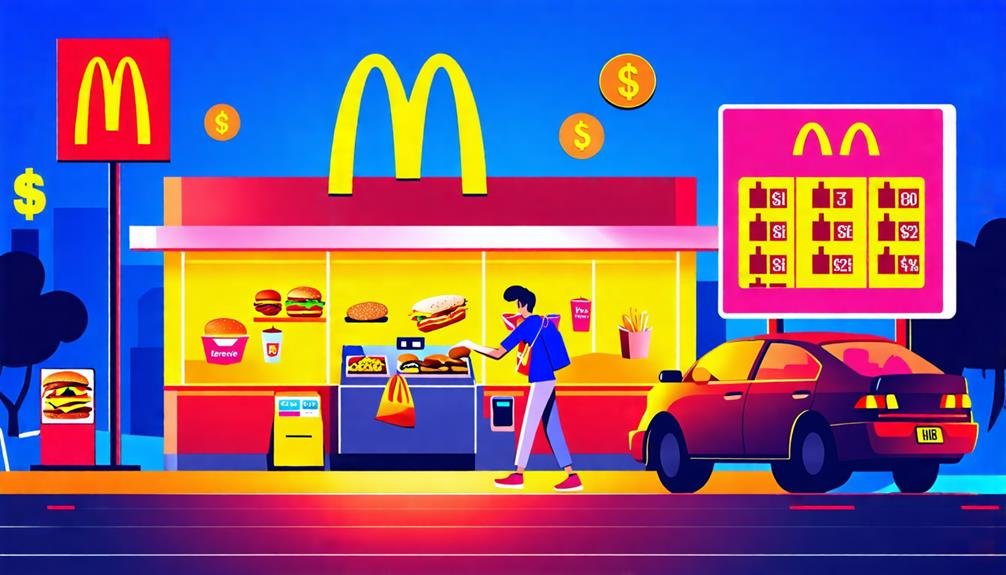
How have inflationary pressures led to the notable increase in McDonald's menu prices over the past decade? Economic shifts have caused a significant rise in costs, impacting what patrons pay at the fast-food chain. In the last ten years, McDonald's menu prices have surged by an astonishing 100%, prompting many diners to ponder the reasons for this trend.
- Ingredient costs: Disruptions in supply chains and heightened demand have resulted in rising prices for essential components, affecting everything from hamburger buns to beef patties.
- Wage expenses: The drive for higher salaries to attract workers in a competitive employment landscape has also escalated operational expenses.
As inflation continues to influence various industries, fast-food leaders like McDonald's must manage these pressures while striving to offer value. While some may complain about the climbing prices, it's essential to acknowledge that economic conditions often dictate menu rates. Understanding this can empower customers to make more informed decisions during these changing times.
Reports of Bag Charges
Numerous patrons have reported experiencing bag charges at specific McDonald's outlets, leading to confusion and surprise over the extra fees. This unforeseen expense has initiated discussions among customers, many of whom are used to receiving bags at no cost. The introduction of bag fees seems to stem from local regulations designed to enhance environmental sustainability and minimize waste.
As communities grow more conscious of ecological effects, McDonald's has aligned with this trend, though not without some challenges. Many customers voice their confusion, especially in areas where bag fees are uncommon. It is important to understand that these charges can differ significantly based on local laws.
While the prospect of paying for a bag may initially be off-putting, it promotes a transition towards environmentally friendly habits. Customers are often encouraged to bring reusable bags, which can save money and positively impact the planet. Adopting this change signifies a broader dedication to eco-friendly living. So, the next time you visit a McDonald's, view it as an opportunity to contribute to this collective effort for a healthier environment!
Variability Across Locations
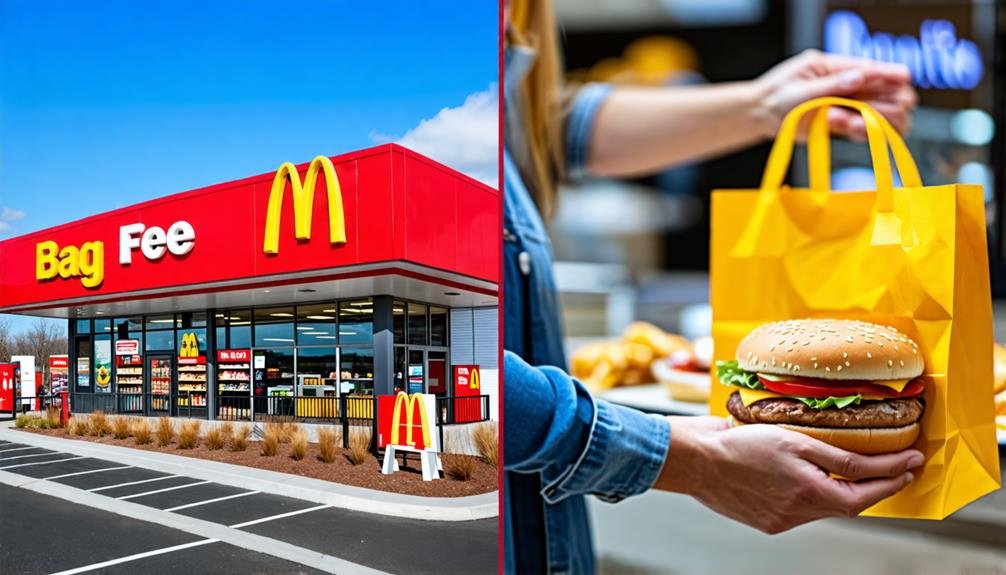
McDonald's bag charge policies differ significantly across various locations. These differences reflect local laws and environmental initiatives. Such inconsistencies can confuse diners, especially when encountering unexpected bag fees. Being aware of these variations enhances the dining experience.
- Local Laws: Certain municipalities and states enforce regulations that require restaurants to charge for bags, encouraging eco-friendly practices.
- Community Efforts: Some McDonald's franchises engage in regional sustainability campaigns, influencing their bag charge policies.
This variability showcases diverse local environmental priorities and encourages customers to participate in community sustainability efforts. When you next visit McDonald's, remember that your choice regarding bags can support broader ecological objectives. By understanding these differences, you can enjoy your meal while making informed decisions that benefit your local environment and economy.
Eco-Friendly Initiatives at McDonald's
McDonald's is making noteworthy progress in its eco-friendly initiatives, showcasing a commitment to sustainable packaging and waste reduction. Local regulations play a pivotal role in shaping bag fees, as cities and states adopt measures to encourage the use of reusable bags. By aligning their practices with environmental goals, McDonald's not only seeks to lessen its ecological footprint but also invites customers to join in the path towards a greener future.
Sustainable Packaging Efforts
McDonald's sustainable packaging initiatives aim to lessen environmental impact through recycled materials and reusable options. The fast-food chain is transforming its packaging practices to meet the rising demand for eco-friendly solutions.
- Recycled Materials: A large portion of McDonald's packaging utilizes repurposed materials, reducing dependence on new resources.
- Biodegradable Options: McDonald's is investigating compostable packaging alternatives that decompose more easily in the environment, further minimizing waste.
These efforts demonstrate McDonald's dedication to environmental stewardship and resonate with consumers who prioritize choices that benefit the planet. As eco-consciousness grows among customers, McDonald's strives to align with their expectations while fostering a healthier world. By adopting sustainable practices, the fast-food leader emphasizes the significance of collective action for a more sustainable future. Together, we can make an impact, one bag at a time!
Local Regulations Impacting Fees
Local regulations shape bag fees at McDonald's, leading to significant variations across different locations. Many municipalities, such as those in British Columbia and Wales, have implemented laws aimed at promoting sustainability by mandating businesses to charge for bags.
These regulations encourage customers to utilize reusable bags, thus nurturing a culture of environmental awareness. However, patrons may feel confused when they encounter charges for paper bags in regions where plastic bags are prohibited, prompting inquiries about the rationale behind these fees. Despite this confusion, McDonald's maintains that bag fees are not intended for profit; rather, they reflect the brand's dedication to eco-friendly practices.
Reusable Bags Encouraged
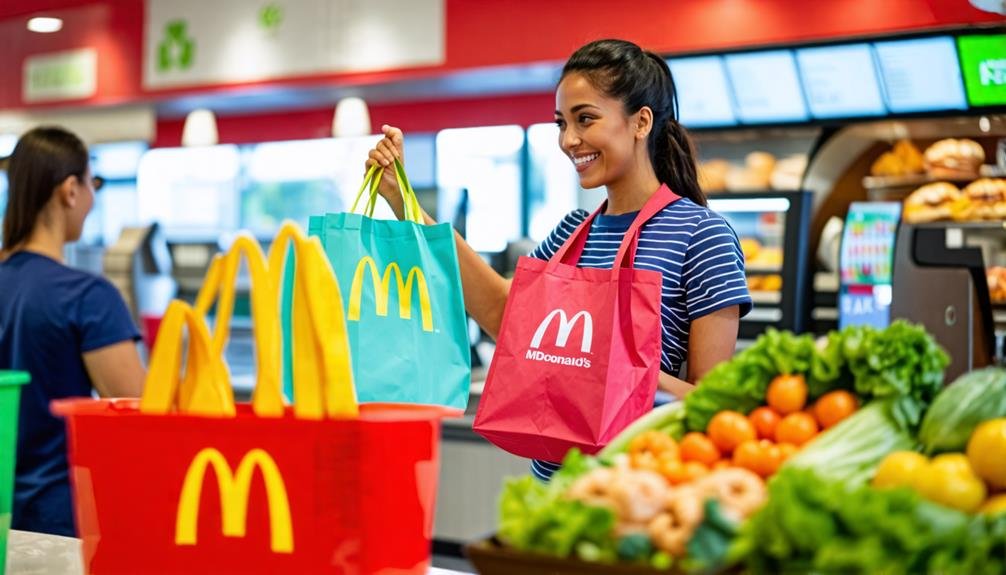
Many McDonald's restaurants actively promote the use of reusable bags as part of their commitment to environmental sustainability. This initiative reduces waste and aligns with the global push for eco-friendliness. By choosing reusable bags, customers can help minimize their environmental impact while enjoying their favorite meals.
- Encourages a culture of sustainability among diners.
- Assists McDonald's in decreasing dependence on single-use plastic bags.
Bringing reusable bags to McDonald's is not only practical; it allows customers to participate in a broader conversation about eco-conscious living. As more diners adopt this practice, they contribute to a healthier planet while embracing sustainable options. Carrying a reusable bag can empower individuals, demonstrating their commitment to protecting our environment for future generations. So the next time you visit McDonald's, remember that your choice of bag can create a significant impact—one meal at a time!
The Bigger Picture on Sustainability
Tackling environmental challenges demands a comprehensive strategy that goes beyond personal actions, incorporating corporate accountability and consumer behaviors. The shift towards sustainability is not merely a passing trend; it represents a crucial transformation that necessitates collective participation. For instance, McDonald's bag fees illustrate how companies are adapting to local regulations while championing environmentally friendly practices.
These bag fees form part of a broader initiative aimed at diminishing waste and curbing dependence on single-use plastics. By motivating patrons to utilize their reusable bags, McDonald's not only complies with municipal laws but also cultivates a mindset of environmental stewardship. This initiative transcends the notion of saving a few cents; it empowers individuals to engage in a larger sustainability mission.
As consumers, we wield considerable influence. Our decisions shape corporate practices and environmental regulations. Accepting this responsibility enables us to relish our favorite meals while also aiding in the creation of a cleaner planet. The journey towards sustainability is built on collective actions, and every effort matters. So, during your next visit to McDonald's, think about bringing your reusable bag—it's a stride towards a brighter, greener future!
